Meta description: Are ants ruining your strawberry plants? Learn how to keep them away! This article provides tips and tricks for keeping ants off of your strawberry plants so you can enjoy a delicious harvest!
Ants are certainly an inconvenience, but they usually don’t harm strawberry plants.
Some people might see them ants on strawberry plants, and ruined strawberry fruit, and think they are the ones causing the damage, while in most cases they are just taking advantage.
It’s much more likely that your strawberry beds are infested with harmful insects such as aphids, scale insects, or mealy bugs.
These insects excrete honeydew, a sticky substance rich in sugars that ants love, from the sap of your plants that they feed on.
The best solution in this case is to identify the real culprit and deal with it.
Ants will most likely leave your strawberries alone if there aren’t other harmful pests attracting them.
Ants aren’t completely harmless though, since they can damage your strawberry beds, both directly and indirectly.
There are many ways to get rid of ants without killing them, as well as natural methods to take care of more important infestations.
- Related article: Ants Killing Plants
Let’s take an in-depth look at these safe and natural methods to deter ants.
Are Ants on Strawberry Plants a Problem?
Even if ants aren’t usually the ones causing the most damage to your entire plant, they are sometimes an issue.
In particular, they are dangerous for young sprouts. However, the main problems they cause are due to their relationship with aphids.
The following are the main issues ants are actually responsible for:
1. Ants Farm Aphids
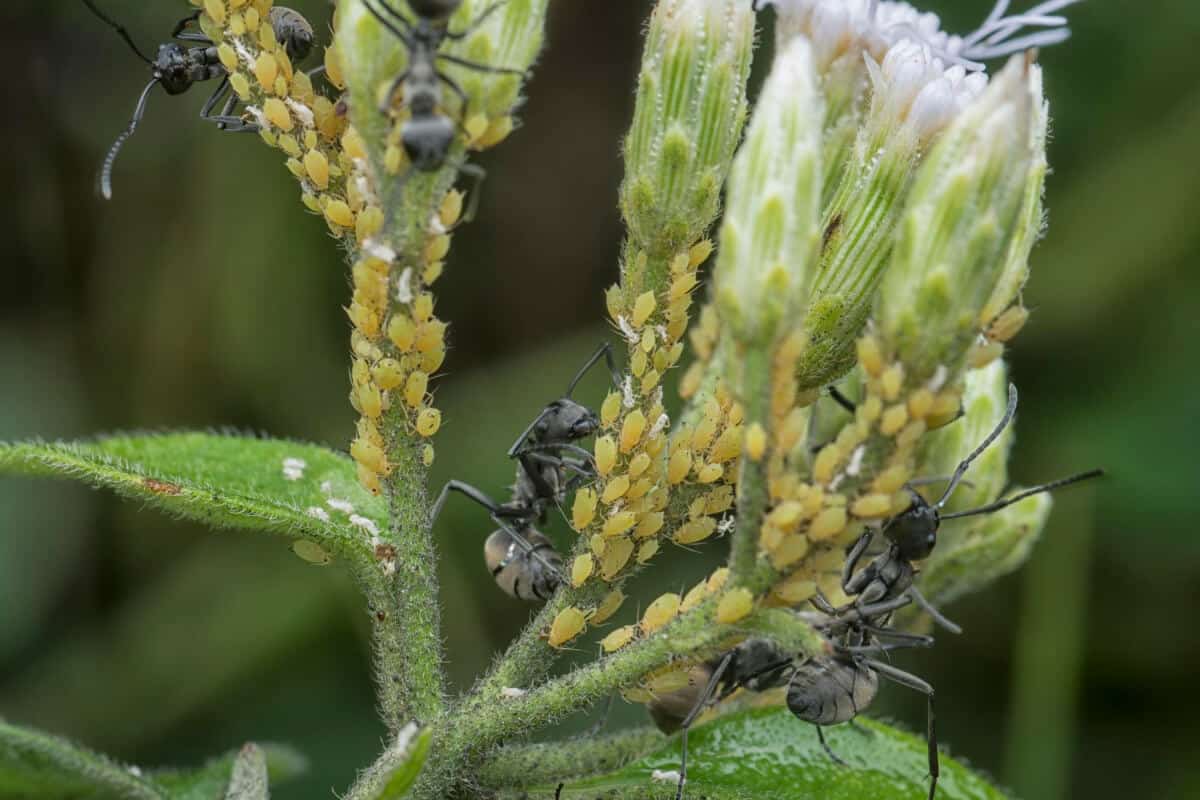
Aphids are brown insects and are the biggest ant bait as they love the substance they excrete.
Ants have learned that by farming aphids, they can always have those sweet secretions, or honeydew, available to be harvested.
They move these honeydew-producing aphids to richer sources of food or directly in their nest and they protect them from their natural predators.
In this way, aphids also benefit and their population grows exponentially.
As you might imagine, this can be a problem for your strawberry plants, which can get severely weakened by the removal of their sap.
In this state, they are more vulnerable to diseases and the risk of dying.
2. Ants Can Bury the Sprouts
When the ant population increases, it needs more space. This means that the ants will build more nests by digging galleries in the ground.
In doing this, they could cover your strawberry sprouts in the dirt. This, of course, will kill them, preventing your plants from spreading.
3. Ants Eat Strawberry Sprouts
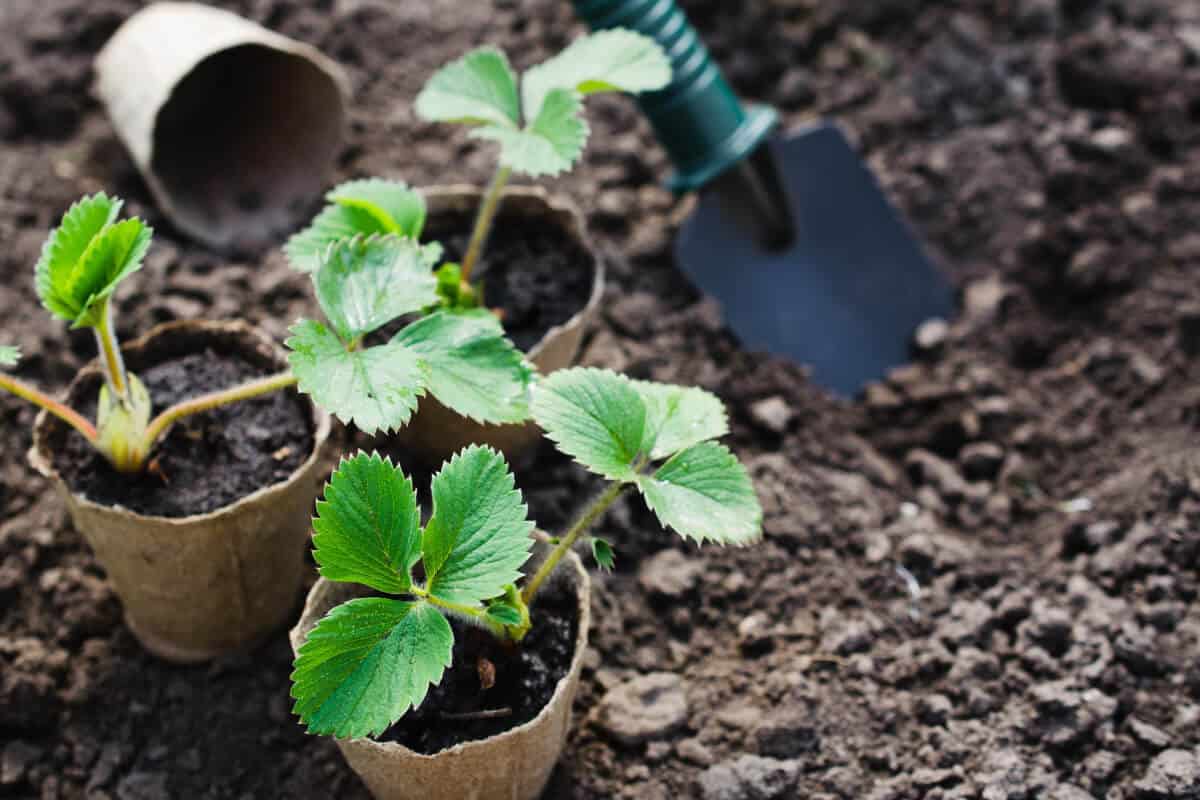
While they usually don’t directly feed from plants as they prefer much easier sources of food, ants are capable of munching on the young sprouts.
While most plants are too tough for them to chew, these parts are tender enough to be easily eaten.
4. Ants Can Eat Strawberries
As mentioned, ants don’t usually eat the plants directly. It’s true, though, that if the fruits have already been damaged by other insects, ants will take advantage.
Most often the problem is slugs, which munch on different fruits, leaving them wide open for ants.
Will Ants Eat Strawberry Plants?
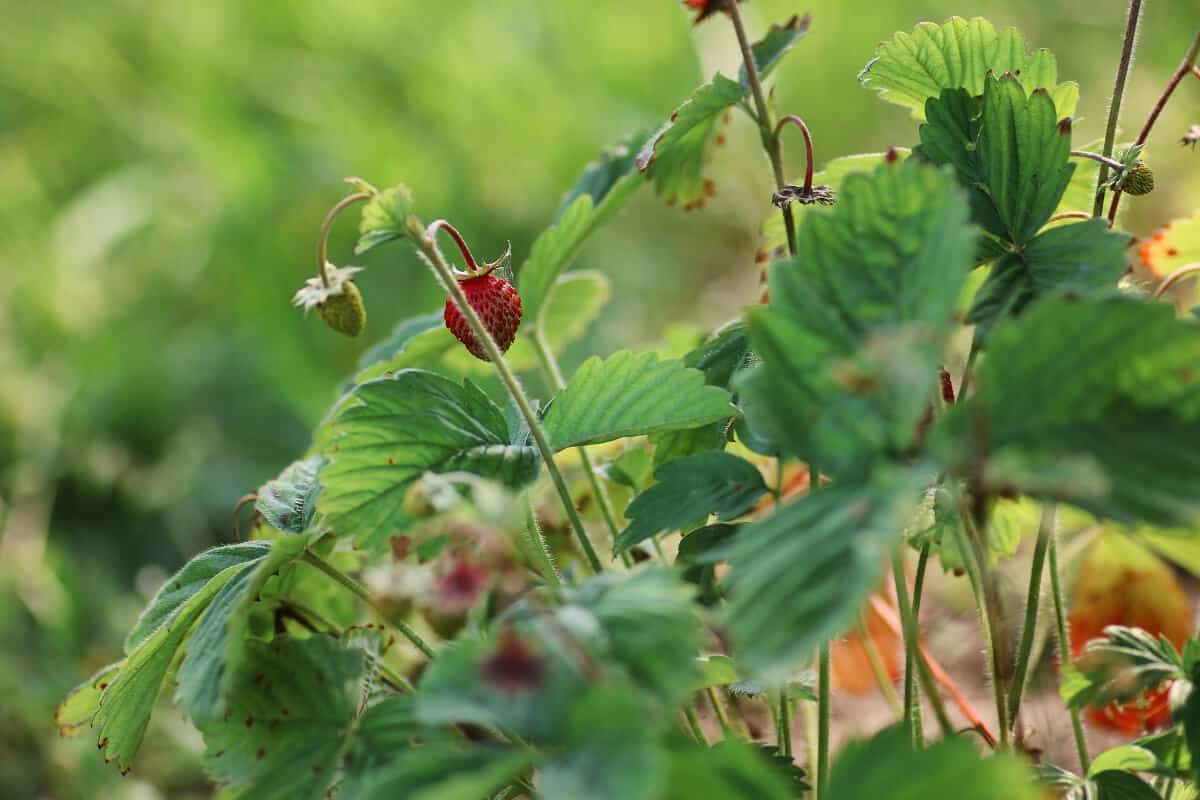
It’s easy to see your strawberry plants with ants crawling on them and think they are the ones harming them.
In most cases though, the ants aren’t the pest causing the damage.
It’s much more likely that ants are attracted to your strawberry plants because there are aphids sucking their sap.
These tiny insects nest on the underside of the leaves, where they feed and excrete sweet honeydew.
Until aphids are no longer present, any method you employ to get rid of ants will be useless.
They will keep coming back as the honeydew the aphids produce is too attractive to them.
Sometimes, ants will actually eat the fruits, but only if their skin has already been broken by other pests, such as slugs.
Ants are incapable of doing it by themselves, but if the strawberry has already been chewed, they take advantage, increasing the damage.
In this instance, you will need to first take care of the slugs, and the ants won’t be a problem anymore.
The only time ants can do real harm directly is when the plants are very young.
These insects are attracted to the most tender parts of plants, so they might damage fresh strawberry sprouts.
How Can Ants Help Strawberry Plants?
Despite the problems they cause, ants aren’t all bad.
They are an important part of the ecosystem and they actually have some positive sides that can make them more helpful than harmful:
1. Ants Pollinate
Ants love anything sweet-flavored, including pollen and nectar. Also, these tiny insects never stop moving from plant to plant to look for new sources of food.
In this way, they help pollinate your strawberry plants to produce better strawberry quality.
2. Ants Aerate the Soil
Thanks to their digging in the ground to build their nests, ants create a maze of empty air pockets around plant roots.
This can make it easier for them to get oxygen and moisture, which will permeate more efficiently from the surface.
3. Ants Feed from Pests
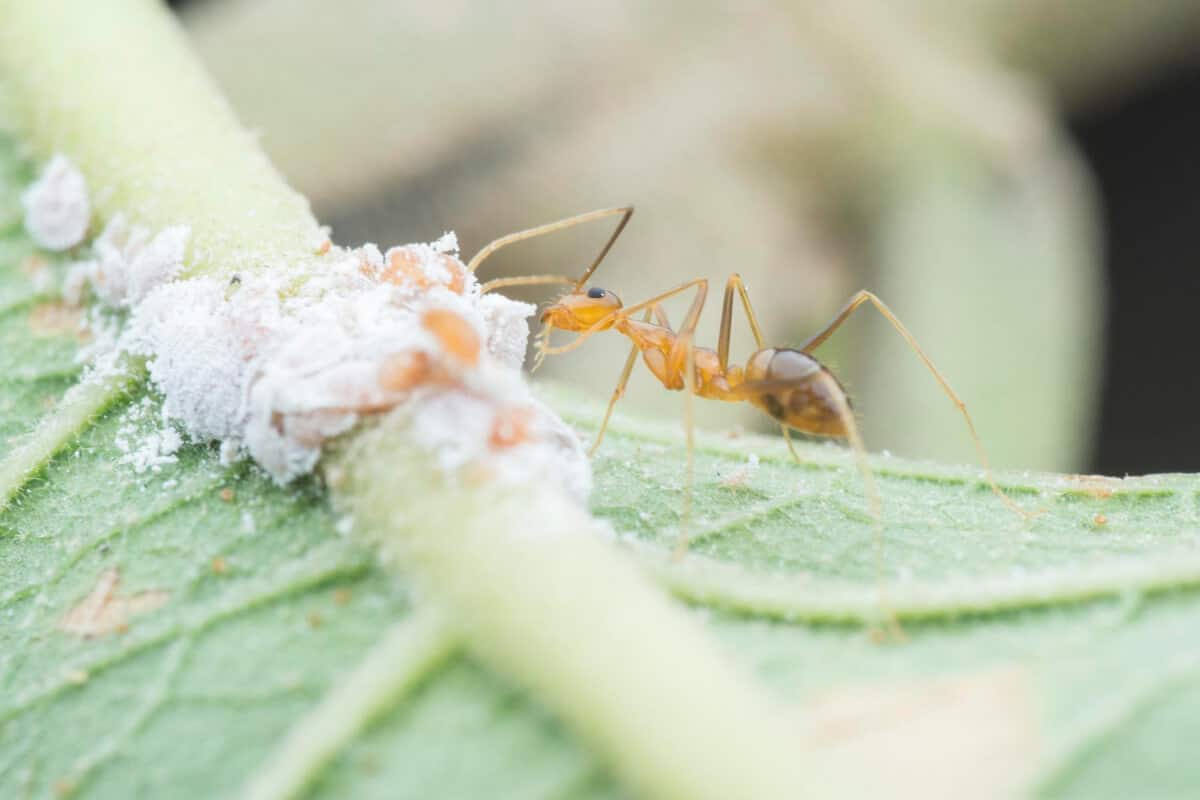
These insects can be an efficient form of biological control. Ants mainly feed on the eggs and larvae of termites, caterpillars, and fleas.
This is very beneficial because it helps with insect control, with their population, and many harmful pests get eliminated before they even have the chance to cause any damage to your plants.
4. Ants are Decomposers
Since they are opportunistic pests, ants take advantage of any easy source of food.
This makes them beneficial for the garden since they start the decomposition process of organic waste, which ultimately releases nutrients in the soil, fertilizing it.
They clean up dead insects, plant parts, and other rotten materials.
Best Ways to Keep Ants Away from Strawberry Plants
Did you know that you can also lay human hair or coffee grounds around your strawberry patch to keep them away from insects?
If you decide that these colony of ants bring more problems than benefits to your strawberry plants, there are many ways to get rid of them.
You can simply deter them from coming near your plants, you can kill them with natural methods, or, as a last resort, you can use chemical pesticides.
1. Get Rid of Aphids
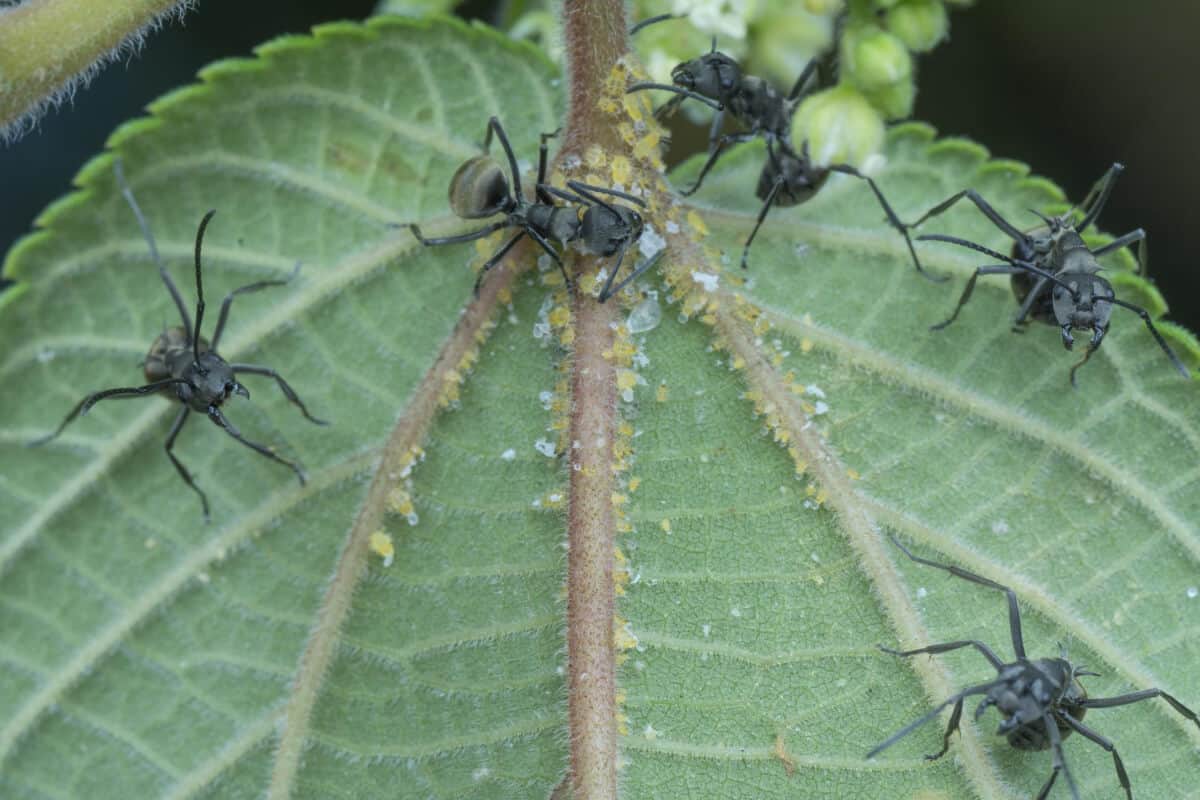
If aphids are present, ants will thrive as well, and it will be impossible to get rid of them. Also, aphids cause much more damage than ants.
One of the best methods to get rid of aphids is by blasting them off with bursts of water. You can do this with a garden hose or a spray bottle, and repeat it whenever you notice them in your strawberry patch.
Your best bet in this case is to use methods that take care of them directly. Sometimes, removing the first leaves to wither and yellow can be enough to have aphids look for food elsewhere.
If the infestation is stronger, you could also introduce ladybugs into the environment, as they are natural predators of aphids.
Otherwise, you can try to use neem oil, insecticidal soaps, or horticultural oils, which are all effective against aphids.
2. Get Rid of Slugs
As mentioned before, garden slugs can be a real problem for your strawberries.
They are the ones that start feeding on the fruits, leaving them wide open for ants who will finish the job.
You can take care of slugs by deterring them or making beer traps.
To deter them, sprinkle coffee grounds or salt around your strawberry plants.
You can easily make bait stations by filling a ground level, shallow bowl or tuna can with any type of beer.
The slugs will be attracted to the bowls with beer, crawl inside and drown.
3. Repellant Plants
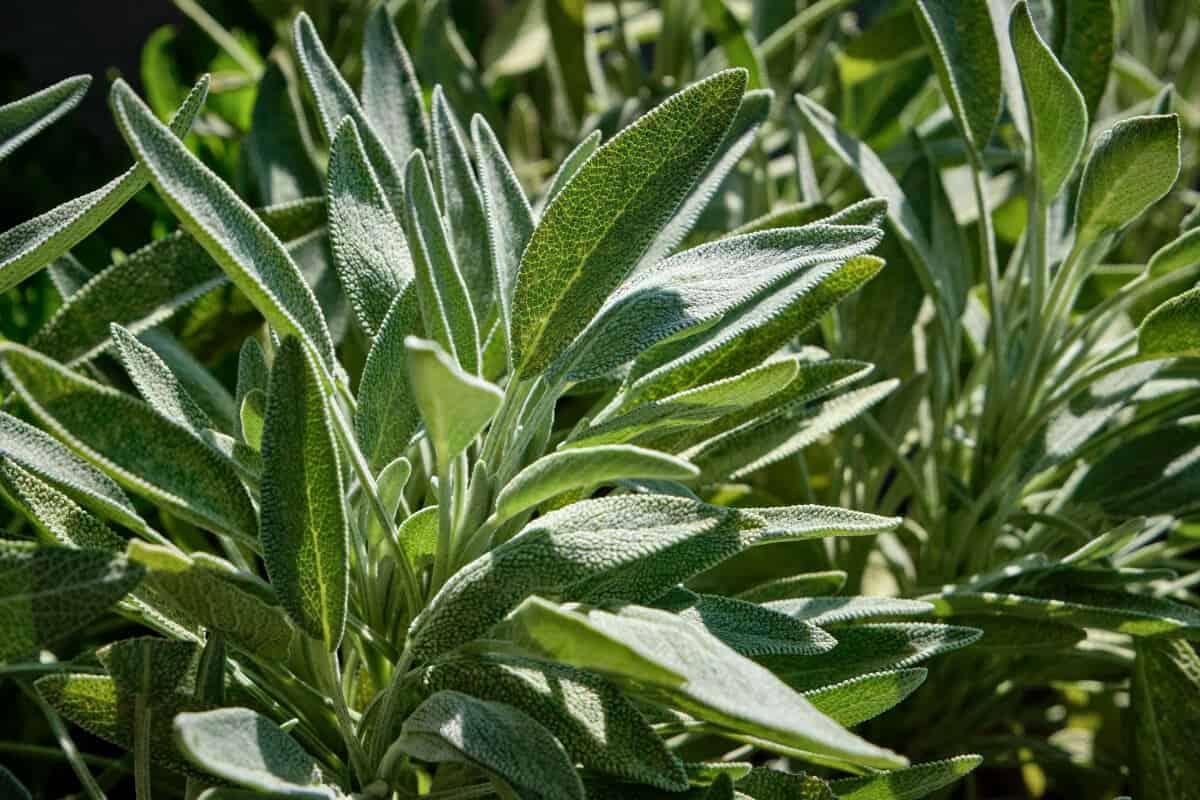
There are many plants that ants find repulsive. By planting some of them around or in between your strawberry plants, you can keep ants away without harming them.
Before choosing the ones to use, make sure they are adapted to your climate and type of soil.
Some examples of plants that repel ants are catnip, spearmint, sage, and cloves.
Pennyroyal is also very effective, but despite its enticing smell, this plant is toxic to most animals.
It’s best to choose other options then, particularly if you have pets.
If you want a quicker solution that takes less space, you could also simply sprinkle the dried leaves of these plants around your strawberries.
4. Salt
If your ant problem is pretty minor, spreading some salt around your strawberry plants might be enough to keep them away.
Ants, like other insects, don’t like salt, so these should deter them from coming near them.
Moreover, it’s well known that salt kills slugs and snails, so you will take care of them too.
This method is pretty quick and easy, not to mention very cheap.
It might be worth a try, but keep an eye on your plants, as it might not be enough to solve the problem.
5. Acidity
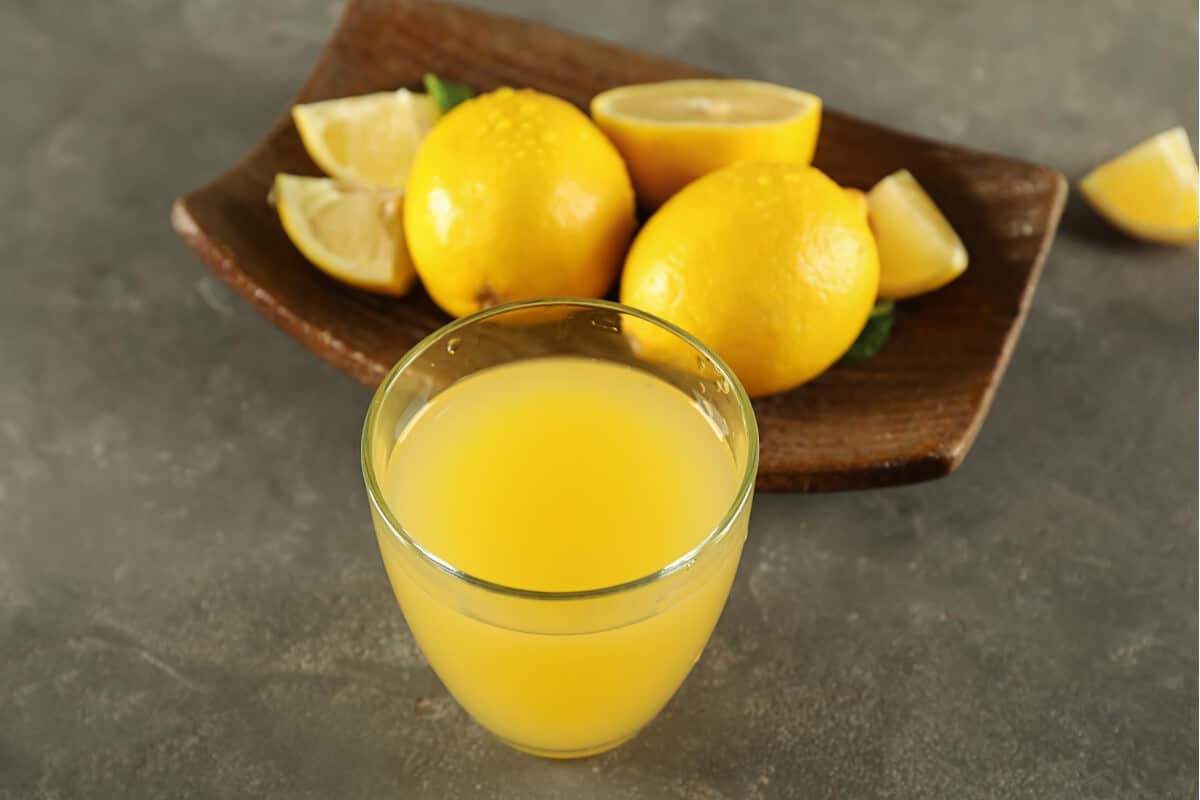
Ants hate acidity just as much as they love sweetness. Spraying some lemon or vinegar on your plants will be enough to deter ants.
In this way, they won’t come near the plants, and they also will not make their nests in the area.
If a colony is already present, you can also douse it directly with an acidic substance.
You can’t use this method for every type of plant, as some of them aren’t adapted to acidic soil. Strawberry plants aren’t among them though, so you can safely spray the soil around them.
6. Diatomaceous Earth (DE)
This is a type of soil made of fossilized algae called diatoms. The very fine, white powder that they form will pierce the ants’ exoskeleton once they’re in contact with it.
This will cause the ant to die in a matter of few days due to dehydration.
It doesn’t cause any damage to your plants and animals, which is why this method is very efficient in taking care of the whole ant colony.
You can spread a bit of DE in the topsoil of your strawberry plants, or you can sprinkle it directly next to any ant nest you manage to locate.
DE can be cheaply bought online or in most gardening stores.
7. Make An Ant Bait
Ants are attracted to sweet things, so you can use this fact to your advantage and make a sweet bait.
For this, you’ll need a cup of borax and a cup of sugar. Mix both ingredients in a bowl and add enough water until it forms a paste.
Then spread the mixture around your strawberry plants, or around any other ant nests you have spotted.
The ants will be attracted to the sweet smell of the bait and eat it, but the borax will work as a poison for them.
Make sure to keep pets away from the area where you put the bait as borax can be toxic for them too.
8. Agricultural Chemical Insecticides
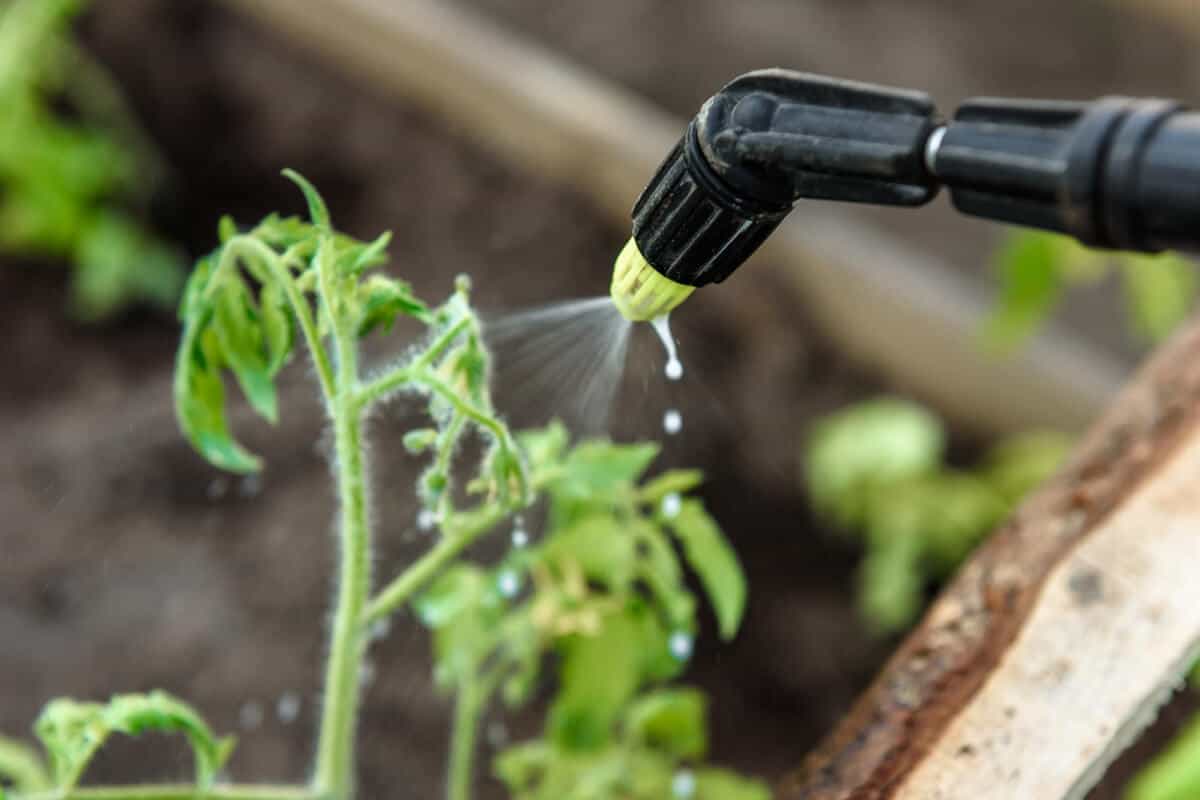
As a last resort, if nothing else works, there are type of chemical products and chemical sprays available that will take care of your ant problem.
Keep in mind though that most of these products contain harsh chemicals and are harmful not only to the environment but also to beneficial insects and sometimes even plants.
Especially in the case of ants, which don’t usually cause serious damage by themselves, it’s best to avoid them.
Ants on Strawberry Plants Final Thoughts
Ants on strawberry plants can be a nuisance, but there are many natural ways to keep them away without using harmful chemicals.
Repellant plants, salt, acidity, diatomaceous earth, beer traps, or even as simple as a blast of water, are some of the tools that can be used to deter ants from entering or nesting around strawberry plants.
Using a combination of traps for different insects work wonders too.
If these don’t work, chemical pesticides may be used as a last resort. Natural insecticide on insects must be looked into first.
However, it is best to avoid them if possible due to their potential harm to the environment, other beneficial insects in the area, and your entire garden.
Take a look at these articles if you want to learn more about ants on strawberry plants:
- Ants in Veggie Garden
- How to Get Rid of Ants on Pepper Plants
- Ants on My Tomato Plants
- Why Are There Ants on My Cucumber Plants
- Ants on Okra Plants
Sources:

